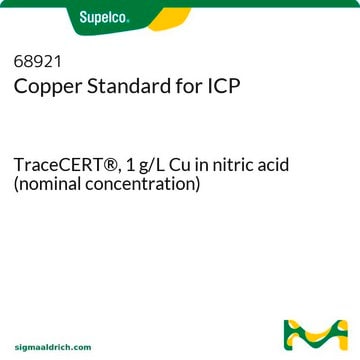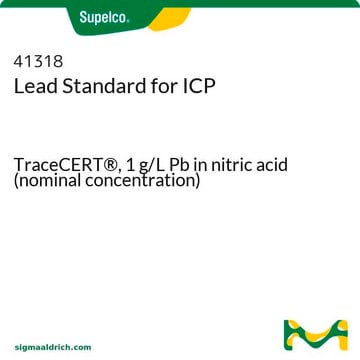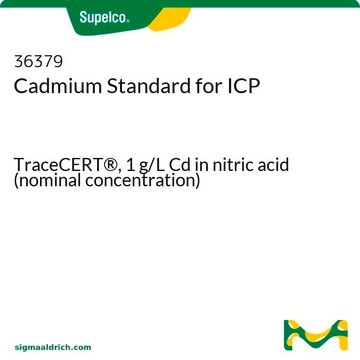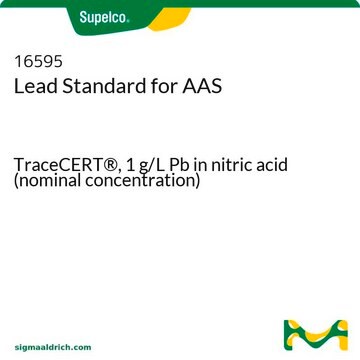BCR017B
Copper (S, P)
BCR®, certified reference material, chips
Synonym(s):
Copper
Sign Into View Organizational & Contract Pricing
All Photos(1)
About This Item
Empirical Formula (Hill Notation):
Cu
CAS Number:
Molecular Weight:
63.55
EC Number:
MDL number:
UNSPSC Code:
41116107
PubChem Substance ID:
NACRES:
NA.24
Recommended Products
grade
certified reference material
Agency
BCR®
form
chips
manufacturer/tradename
JRC
resistivity
1.673 μΩ-cm, 20°C
bp
2567 °C (lit.)
mp
1083.4 °C (lit.)
density
8.94 g/mL at 25 °C (lit.)
application(s)
general analytical
format
matrix material
SMILES string
[Cu]
InChI
1S/Cu
InChI key
RYGMFSIKBFXOCR-UHFFFAOYSA-N
General description
Certified for the mass fractions of phosphorus and sulfur.
Analysis Note
For more information please see:
BCR017B
BCR017B
Legal Information
BCR is a registered trademark of European Commission
Storage Class Code
11 - Combustible Solids
WGK
WGK 2
Flash Point(F)
Not applicable
Flash Point(C)
Not applicable
Personal Protective Equipment
dust mask type N95 (US), Eyeshields, Gloves
Choose from one of the most recent versions:
Certificates of Analysis (COA)
Lot/Batch Number
Sorry, we don't have COAs for this product available online at this time.
If you need assistance, please contact Customer Support.
Already Own This Product?
Find documentation for the products that you have recently purchased in the Document Library.
Marius Andruh
Chimia, 67(6), 383-387 (2013-08-16)
The node-and-spacer approach is widely employed in crystal engineering to construct coordination polymers. It consists of self-assembly processes involving mononuclear cationic species and exo-dentate ligands. We enlarged this strategy using preformed homo- and heterometallic complexes as nodes. The presence of
Ping Ning et al.
Journal of environmental sciences (China), 25(4), 808-814 (2013-08-09)
Metal (Cu, Co, or Zn) loaded ZSM-5 and Y zeolite adsorbents were prepared for the adsorption of hydrogen cyanide (HCN) toxic gas. The results showed that the HCN breakthrough capacity was enhanced significantly when zeolites were loaded with Cu. The
Ren Zhang et al.
Chimia, 67(6), 393-396 (2013-08-16)
Three new R-isophthalic acid-based (R = H or Br) coordination polymers have been designed and synthesized. By changing the N-containing ligand in the system, we are able to tune the dimensionality of coordination polymers from one-dimension (1D) to two-dimensions (2D)
Taekyung Yu et al.
Journal of nanoscience and nanotechnology, 13(5), 3250-3253 (2013-07-19)
Copper (Cu) nanoparticles with controllable sizes were successfully synthesized by using a modified reverse micelle method, in which copper(II) acetate was reacted with L-ascorbic acid in a solution containing water and xylene in the presence of oleic acid and oleylamine
The combined effects of DOC and salinity on the accumulation and toxicity of copper in mussel larvae.
D Deruytter et al.
Communications in agricultural and applied biological sciences, 78(1), 15-18 (2013-07-24)
Our team of scientists has experience in all areas of research including Life Science, Material Science, Chemical Synthesis, Chromatography, Analytical and many others.
Contact Technical Service






